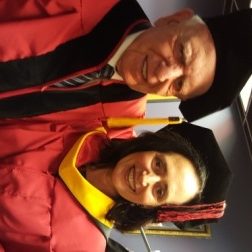
Lifestyle/Community

Hon. Rutgers doctorate for Raymond Ackerman
SUZANNE BELLING
PHOTOGRAPH SUPPLIED
Pictured: Iconic businessman and philanthropist Raymond Ackerman with his daughter Suzanne Ackerman Berman at the Rutgers University graduation ceremony in New Jersey where Ackerman received an honorary doctorate of letters.
His daughter Suzanne Ackerman Berman, transformation director and chairman of the Ackerman/Pick n Pay Foundation, accompanied her father on his 10-day trip to the US.
Raymond Ackerman believes that business is not only about the maximisation of profits, but about investing in and contributing to the communities one serves.
The link between the Pick n Pay and Rutgers MBA programme was forged eight years ago when Suzanne began an annual course of lectures to the American MBA programme students from Rutgers, who came out to Pick n Pay to study the company’s philosophy on the environment and social economy.
In his acceptance speech, Ackerman said: “My philosophy is simple. I describe my business as a table. Customers are the top of our table. Without them we have no business. We strive to win their loyalty every day. We try to make their lives easier in tough times. We celebrate with them in good times.
“To stand and be firm, a table must have four legs. The administration of the business forms one leg. The products we sell and our relationship with our suppliers form a second leg. Our people make up a crucial third leg of the table. They carry the soul and values of the organisation, so we must nurture and invest in them.
“The fourth leg, which makes the table strong and secure, is social responsibility. I have always believed that no organisation can ever stand alone. We only succeed if the society in which we operate succeeds. We must always strive to make our contribution to that society.”
His belief is that the customer sits on the top of the table and remains king.
Referring to Nelson Mandela, he said the former president had told him that South Africa needed more entrepreneurs to create and spread wealth to build a stronger nation.
South Africa is facing challenges and needs to grow the economy effectively and transform the lives of its people more definitively. This progress needs to be swift.
“But I am an optimist. I remain as excited as I have ever been about the future of our country. Our potential is boundless. We will, in the end, succeed.
“The key is leadership. We do not lack hope in South Africa, but we need leaders who can take that hope and transform it into a vision and programme for all, in which we can all share,” Ackerman said.
In her address Suzanne Ackerman Berman referred to globalisation and, in that context, suggested there were two types of leaders, those who build walls and those leaders who build bridges.
“I am passionate about searching for a new wave of leaders, taking the enormous step into the wide village we call the world.”
She decried the building of walls and division of society as “sadly common themes that we cannot escape.
“While the physical apartheid walls dividing [South African] society on racial grounds may have fallen, the psychological walls and remaining damage will take many more generations to repair; the emotional scars run very deep.”
The building of bridges is based on positives – trying to develop connections and links among people of different backgrounds to create bonds that look past those surface differences of colour, language, ethnicity or religion.
“We can all probably think of unsung bridge builders who have influenced our lives. It is in this sphere, rather than in the political arena, that Africa – like everywhere else in the world – has some wonderful examples…
“We need to, as humanity, find our voices to speak out against inequality and discrimination in any shape or form, to forbid the builders of walls to dominate.”
The builders of walls play on fears, which is a classic old recipe for clinging to power. They need to stand up and become builders of bridges and remove the invisible walls based on prejudice of race, tribe, gender, sexual preference or religion.
“These invisible fences are destructive – they are built on stereotypes, xenophobia and prejudice.
“Business has an obligation to address the inequalities of the past by learning to combine cultural differences, racial inequalities and societal indiscretions, with successful commercial application,” she said.




